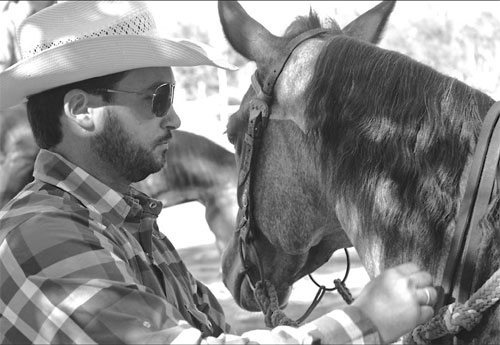Wanted: Cowboys in China
Updated: 2012-08-25 11:02
By Liu Lu (China Daily)
|
||||||||
Foreign trainers mosey into the country as horse riding becomes popular among urban residents
Tyrel Hotchkiss has just ridden into town to make a fresh start. The young cowboy from South Carolina is a stranger in these parts, but the territory is no stranger to horsemen and horses.
This is not the hills of Montana or the plains of Wyoming. This is northern China's Inner Mongolia autonomous region, and the town is the booming city of Ordos, with a population of close to 2 million.
|
 A foreign trainer at Bangcheng Equestrian Club in Ordos, Inner Mongolia autonomous region, tends to a friend. [Photo / China Daily] |
Hotchkiss is going to start his career as a full-time horse trainer in China, putting into practice what he has learned over the past 14 years.
Like Hotchkiss, more foreign horse breakers, particularly from the United States and Europe, have been moseying into China in recent years as horse riding becomes increasingly popular among young, well-heeled urban residents.
"I would imagine Chinese people's interest in Western riding probably comes from their interest in watching Western movies, so there is probably some fascination about that," said the 26-year-old cowboy, perhaps unaware of the area's own historic relationship with the horse.
But in truth, the growth of equestrianism in China, is more likely due to people's rising enthusiasm for Western sports, coupled with the nation's growing wealth.
However, its development faces a major obstacle, as China is desperately short of experienced horse trainers.
Li Yanyang, editor-in-chief of the Chinese publication Equestrian Magazine, said the country will need many trainers from overseas in the next five to 10 years to meet demand.
"Although a comprehensive and high-quality equestrian infrastructure is in place, China's emerging professional horse industry has a severe shortage of equestrian professionals, particularly high-level trainers," Li said.
He said although some equestrian clubs have spent millions of yuan to buy good 2- to 3-year-old racehorses from overseas, they still lack access to international horse breeders and trainers, which is crucial for the development of riding clubs and other similar business.
"In the past five years China's equestrian clubs have sourced an average of more than 1,000 horses each year from overseas breeders, of which most are expensive, sturdy horses from Germany, France and the Netherlands," Li said, adding that the number is projected to increase substantially over the coming years.
"But the problem is when those horses have arrived in China after what can be a series of cumbersome procedures, very few experienced Chinese domestic trainers are able to train them.
"We have to face the reality that there is still a huge gap between China and Europe, where they are the most developed in horse training techniques."
Li said China's first equestrian club opened in the 1980s, but the sport became popular in Europe before World War II.
"We are very dependent on these horse trainers introduced from abroad to give professional training to imported horses," Li said. "If we don't do this, the huge cost of buying horses will be a waste of money."

 Relief reaches isolated village
Relief reaches isolated village
 Rainfall poses new threats to quake-hit region
Rainfall poses new threats to quake-hit region
 Funerals begin for Boston bombing victims
Funerals begin for Boston bombing victims
 Quake takeaway from China's Air Force
Quake takeaway from China's Air Force
 Obama celebrates young inventors at science fair
Obama celebrates young inventors at science fair
 Earth Day marked around the world
Earth Day marked around the world
 Volunteer team helping students find sense of normalcy
Volunteer team helping students find sense of normalcy
 Ethnic groups quick to join rescue efforts
Ethnic groups quick to join rescue efforts
Most Viewed
Editor's Picks

|

|

|

|

|

|
Today's Top News
Health new priority for quake zone
Xi meets US top military officer
Japan's boats driven out of Diaoyu
China mulls online shopping legislation
Bird flu death toll rises to 22
Putin appoints new ambassador to China
Japanese ships blocked from Diaoyu Islands
Inspired by Guan, more Chinese pick up golf
US Weekly

|

|






